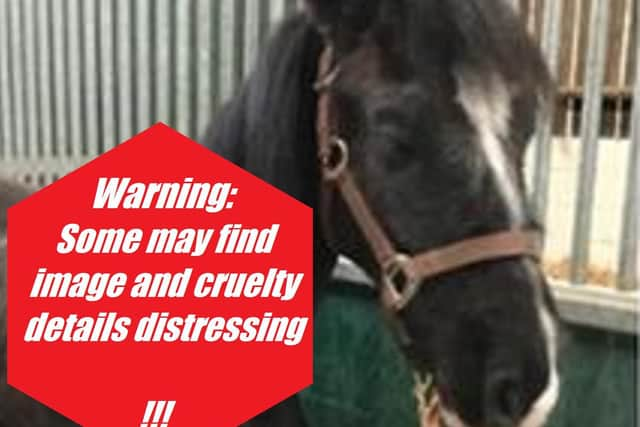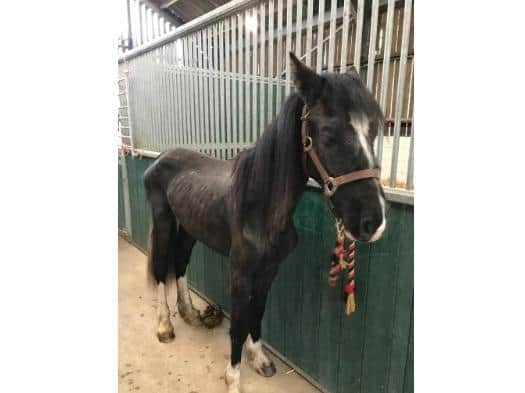'Worst is yet to come' fears RSPCA after being called to 46 incidents involving horses in Hertfordshire during lockdown
and live on Freeview channel 276
RSPCA fears a second wave of equine crisis: “The worst is yet to come.”
The RSPCA is warning that a financial recession could plunge the country into a second wave of a horse (equine) crisis which has already led to thousands of dumped and dying horses and crippled welfare charities.
Advertisement
Hide AdAdvertisement
Hide AdDuring lockdown, the RSPCA has been called about 46 equine incidents in Hertfordshire, sparking fears that more sick horses will be dumped across England and Wales


In 2019, the charity received reports of more than 4,370 incidents involving horses in the south east of England, with 453 in Hertfordshire, the fourth highest county in the region.
By the end of the year it had nearly 900 in its care nationally, leaving its rescue centres full and funding hundreds more in private boarding.
Now the charity fears much worse is to come if, as expected, the Covid crisis sparks a UK and global recession.
Advertisement
Hide AdAdvertisement
Hide AdEquine welfare charities are already under immense strain, following the horse crisis which was sparked off by the 2008 financial crash and the sector is extremely concerned about the welfare repercussions for horses in the months ahead with an estimated 7,000 horses at risk of suffering nationally.


The RSPCA is appealing for vital donations to help it prepare for an influx of horses and ponies desperately in need of help.
Christine McNeil, the charity’s National Equine Inspectors Co-Ordinator, said: “This is a truly worrying time for equine charities - we still haven’t got a handle on the repercussions of the current horse crisis, and it now looks like the worst is yet to come.
“In April 2011, before the effects of the financial recession had hit, the RSPCA had 290 horses in its care, already more than our official stables could house.
Advertisement
Hide AdAdvertisement
Hide Ad"The following year, the impact of the crisis really began to hit and our officers were called out every day up and down the country to neglected and abandoned horses.
"By May 2012, the number of horses in our care had leapt to 600.
"Fast-forward to today, and we’re caring for 927 horses - that’s three times the amount since the crisis hit, and we strongly fear that the impact will be even worse this time round.
“With such a huge number of horses in our care, and so many in private boarding, at great cost, we have already had to adapt how we try to help as many horses as we can.
Advertisement
Hide AdAdvertisement
Hide Ad"For example, several ‘herds’ of horses in need are being cared for in situ with our officers visiting regularly to feed and care for them, until we can find spaces in one of our centres for them, or funds to transport them to private boarding.
"Our Sussex-based animal collection officer (ACO) Julie Parsons was a great example of this when she was travelling each day to check on a group of neglected Shetland ponies. Thankfully now the herd is being cared for at one of our animal centres.”
The current horse crisis is thought to have been sparked by continued overbreeding, coupled with falling demand for some types of horses, which left a surplus of unwanted animals which have been left dumped like rubbish, sometimes extremely sick or dying, leaving equine charities bursting at the seams with these abandoned animals.
Threats of a financial recession this year has led to fears that irresponsible horse breeders will continue to breed their animals in a bid to turn a quick profit and that existing horse owners will struggle financially to keep their animals and cover vet bills.
Advertisement
Hide AdAdvertisement
Hide AdThis may lead to animals suffering, and some may even resort to abandoning their animals out of desperation.
Between March-May 2020 including during the lockdown period, the charity has received reports of 472 incidents relating to horses in the south-east alone, with high numbers of calls coming from regional ‘hotspots' including Hertfordshire, Kent, Greater London and Essex.
The RSPCA has taken in 82 horses during lockdown already, bringing the total number of horses in the charity’s care to 927.
This figure is much more than the charity can care for at its own centres, forcing the charity to pay for three quarters of horses to be housed at private boarding stables.
Advertisement
Hide AdAdvertisement
Hide AdThe charity spends approximately £5,200 per year for the care of each horse taken in - that’s over £4.8 million each year.
The RSPCA has been working alongside the Blue Cross, Bransby Horses, British Horse Society, Redwings, The Donkey Sanctuary and World Horse Welfare, in a bid to tackle this national crisis. Many of these charities have seen their income plummet while still continuing to look after the horses in their care.
Equine organisations have also been hit by the difficulty of rehoming under the present restrictions.
The RSPCA has managed to rehome 21 horses in the ten weeks since lockdown - this compares to 56 in January and February.
Advertisement
Hide AdAdvertisement
Hide AdChristine added: “The public’s help is absolutely vital to keep the RSPCA afloat during this extremely difficult time.
"We can’t stress how much we need loving homes for our horses and ponies, and we are urging those with experience of horses to please consider rehoming one of our wonderful rescue horses.
"Last year (2019), we rehomed 242 horses and ponies to loving new homes, with many going on to become superb children’s riding ponies, happy hacking horses, fantastic project youngsters, and wonderful retired companions.”
To make a donation and help the RSPCA keep rescuing horses, providing them with essential veterinary care, rehabilitation, and finding them new homes through these unprecedented times, visit: www.rspca.org.uk/covid.